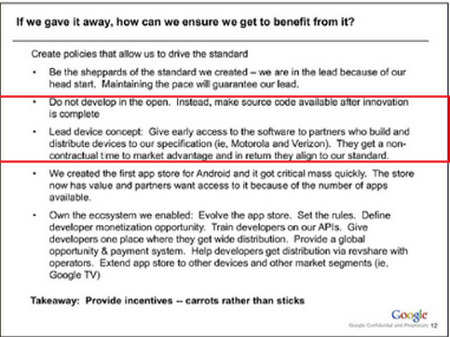Did Google favor Motorola and Verizon?
Sep 9, 2011 — by LinuxDevices Staff — from the LinuxDevices Archive — 1 viewsA Google document revealed via Oracle's Android-related patent infringement suit against the company shows favoritism toward Motorola and Verizon, Foss Patents blogger Florian Mueller has charged. Yet both HTC and Samsung,as well as T-Mobile and Sprint, have also been graced with “pure Google” devices, other analysts note.
For several months, pundits and folks with grudges against Google's Android operating system have speculated that the provider of the world's leading smartphone platform has a heavier hand in the release of its platform to open source than it led us to believe. Google didn't do itself a favor earlier this year when it withheld its Android 3.0 ("Honeycomb") code from open source development. That called into question just how "open" Android really is.
Now some new evidence has arisen that appears to show Google's increasingly proprietary bent. Check out the bombshell below, courtesy of an internal Google document Foss Patents blogger Florian Mueller fished out of the myriad files in the patent infringement case against Google by Oracle.

Internal Google document revealed in Oracle patent case
Source: Google/Foss Patents
(Click to enlarge)
The document appears to reason how Google can profit from ceding Android to developers under an open source license. This is the key part of the document: "Lead device concept: Give early access to the software to partners who build and distribute devices to our specification (ie, Motorola and Verizon). They get a non-contractual time to market advantage and in return they align to our standard."
Meanwhile, Oracle noted in a filing that Google actively participates in the design and build of some device makers' handsets, and signs off on the final Android build. As Mueller noted, this is confirmation that the Android source code tree has "private branches," and that some OEMs were always more equal than others.
Mueller wonders how Samsung, HTC, LG, or Sony could still trust Google if it acquires Motorola. He suggests these companies will be nervous that Google will seed Motorola with privileges.
 TechCrunch's Jason Kincaid offered a valuable counter-argument, noting that it's well-known Google works with these partners separately and helps usher some of the builds to market. For example, while it is true that Google worked closely with Motorola and Verizon Wireless on the first Motorola Droid (pictured), as well as on the Motorola Xoom tablet, Google has offered exclusive premieres of new Android releases with other vendors and carriers as well.
TechCrunch's Jason Kincaid offered a valuable counter-argument, noting that it's well-known Google works with these partners separately and helps usher some of the builds to market. For example, while it is true that Google worked closely with Motorola and Verizon Wireless on the first Motorola Droid (pictured), as well as on the Motorola Xoom tablet, Google has offered exclusive premieres of new Android releases with other vendors and carriers as well.
Google worked with HTC to launch a Google-branded Nexus One on T-Mobile, giving it a head start on Android 2.1 over other phones in early 2010. Late that year, the Samsung-built, Google-branded Nexus S launched on T-Mobile, and for several months reigned as the only Android 2.3 ("Gingerbread") phone and the only one with an NFC radio. The similarly un-skinned Nexus S 4G (pictured below, at left) was fielded by Sprint.
 Verizon is allegedly getting the "Ice Cream Sandwich"-based Samsung Droid Prime, so Google seems to be spreading around the "pure Google experience" equally enough.
Verizon is allegedly getting the "Ice Cream Sandwich"-based Samsung Droid Prime, so Google seems to be spreading around the "pure Google experience" equally enough.
Of course, all that could change if Google follows through on its acquisition of Motorola later this year or in early 2012. Here, Kincaid's strongest counterpoint is that Google wouldn't favor Motorola because "this is a land rush," he writes. "Google has every reason to keep as many OEMs pumping out as many Android devices as possible; it isn't about to infuriate them all by turning Motorola into its blessed favorite."
To wit, keep everyone happy. That makes good business for Google, which as Mueller noted later in his post, is geared to drive search and ads on Android handsets.
What's wrong with this? Google is a bee, pollinating different OEMs and carriers with its Google essence before moving on to the next device and OS build. If only Google had opened Honeycomb to complete the metaphor!
While both Mueller and Kincaid pose valid arguments, Mueller's illumination of this practice may simply serve as ammunition for federal regulators mulling whether or not to block the deal. Investigators at the Justice Department or Federal Trade Commission (FTC) may not effectively grok how Google's Android ecosystem works.
The Feds may smell favoritism, however — even if it is liberally laced throughout Google's partners — and squash the Motorola deal outright because they feel the company will use Motorola as an ax to chop at other OEMs' legs. This has to be a concern for Google, which is already under the antitrust microscope by the FTC for business practices regarding search, and possibly Android.
The upshot of this is that if regulators press Google on its practices, they may become public, which means we'll learn a lot about how Google runs its mobile business. Of course, Google could sell the Motorola hardware business and simply keep the 17,000 patents to foil future attacks on Android. In this case, the favoritism question becomes moot.
Clint Boulton is a writer for eWEEK.
This article was originally published on LinuxDevices.com and has been donated to the open source community by QuinStreet Inc. Please visit LinuxToday.com for up-to-date news and articles about Linux and open source.